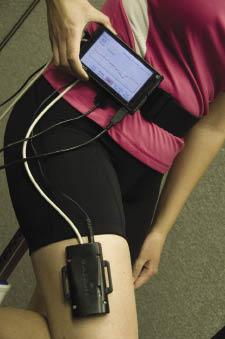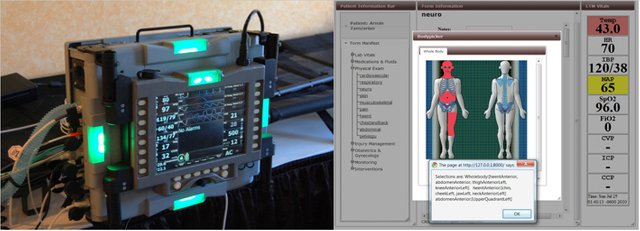Space Medical Technology to the Rescue
Telemedicine in Space?
Technology is advancing at an ever-increasing rate and with this advancement comes the opportunity to advance medicine to distant places. Recently, two college graduate students from the University of Alberta, Ian Watts and Michael Fiest, created an augmented reality imaging system. This system allows doctors to use medical images projected on the body to assist them in seeing internal body parts. Although only in the research phase, such an instrument could become a key feature for laparoscopic surgery or planning for surgical procedures (Johnson, 2018).
With Elon Musk's push for Mars, such devices may provide the specialty medicine needed for a ground medical unit on Mars. Currently, NASA is conducting an Airway Monitoring study into the possibility of crews getting airway inflammation caused by toxic dust. This dust would come from free-floating particles which are more toxic than particles on Earth. Should medical attention be necessary, the ProjectDr might provide one tool medical personnel on Mars can use in coordinating medical procedures with medical experts on Earth.
Another research project being conducted by Dr. Babs Soller from the University of Massachusetts Medical School is dubbed as the "Venus Prototype." This device uses near-infrared light. Blood vessels absorb some of the light and then reflects back the rest. This then provides information about an individual's metabolic rate, tissue oxygen, and pH. Dr. Soller said, "Eventually, we expect first-responders would have these devices, which would provide feedback on the severity of a person’s injury” (Nanowerk News, 2009). “The measurement of metabolic rate will let astronauts know how quickly they are using up the oxygen in their life-support backpacks. If spacewalking astronauts run low on oxygen, the situation can become fatal.” This will be extremely important as Mars crews establish all the infrastructure needed for a Mars base.

With all the possible risks associated with a Mars mission, medical care will be critical for these travelers. The final device I will discuss is the Lightweight Trauma Module (LTM)/iRevive System. With every emergency comes the task of recording all the information concerning a patient. This will be especially true on Mars. This system provides the ability for responders to use a graphic user interface (GUI) to navigate through various screens, record and lookup needed information, and determine necessary actions. Responders touch the affected body part on the screen and the system guides them through response processes and provides for data entry when information is required for input. The telemedicine feature allows medical personnel on Earth to monitor what’s happening and provide assistance concerning medical treatment. The machine provides warning alarms to alert responders when actions are due such as changing IV bags, an abnormal set of vital signs, or ventilator malfunction.
With further technological advances, are Star Trek type medical devices around the corner? One may never know. What is for sure is that the future of medicine will be much different than today. The research will benefit both those journeying to the stars as well as the people of Earth. Additionally, remote locations on Earth without medical care may become a thing of the past.


Being A SteemStem Member
Thanks!
It's Not Whether You Get Knocked Down, It's Whether You Get Up
Telemedicine? What about tele-everything else?? I really enjoy articles like this because they get the creative thoughts going about a wide range of challenges a smaller isolated population will have to deal with on a regular basis. I imagine that a lot of highly specialized technical work will have to be addressed in the same way as medicine will. Not to mention how unforeseen challenges and developments will have to be assisted with by something like "mission control". Who will be that mission control if the missions are being sent out from private corporations and how will information sharing about the solutions they developed happen? It's a very interesting direction space exploration is currently heading.
You're absolutely right about that. I foresee people from multiple nations getting involved on a trip and it will be interesting if they have to create a multinational mission control to keep the peace. The future will be filled with many surprises.